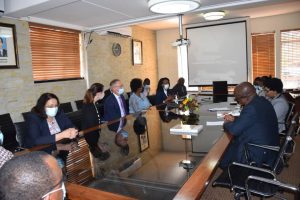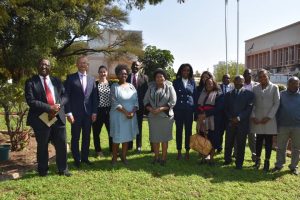Botswana Minister of Environment, Natural Resources, Conservation and Tourism, Honourable Philda Nani Kereng who is also the Vice-Chairperson of SASSCAL Council of Ministers hosted the SASSCAL Board Members on 26 July 2022.
The Board members in the delegation to the Minister include Board Chair and Zambian representative, Mrs Jane Mubanga Chinkusu, Professor Virginia Lacerda Quartim (Angola), Ms Abigail Engleton, and Mr Balisi Gopolang (Botswana), Dr Karsten Hess and Dr Svenja Kruse (Germany), Mrs Sophia Kasheeta and Mr Kintinu Sageus (Namibia) and Prof Yonah Seleti and Dr Dumisani Mthembu representing South Africa. Ex-Official Members of SASSCAL Board; SASSCAL Executive Director Dr Jane Olwoch and the Chair of the Scientific Advisory Committee of the Board, Dr Joel Botai were also present.
In her remarks, SASSCAL Executive Director also used the opportunity to introduce Dr Budzanani Tacheba, the newly appointed Director of Science, Technology and Capacity Development at SASSCAL who was also part of the delegation.

Botswana Environmental Minister, Hon. Philda Nani Kereng hosting SASSCAL Board Members
The Southern African Science Service Centre for Climate Change and Adaptive Land Management’s (SASSCAL) Governing Board, held their 2nd Ordinary Board Meeting in Gaborone Botswana on 25 – 29 July 2022.
Welcoming the delegation, Hon. Minister commended SASSCAL’s capacity development efforts in climate change and held that this is in line with the country’s aspirations of being a knowledge-based economy highlighting that the availability of updated and aggregated data is essential for policy decisions. In addition, the digitisation of SASSCAL-produced datasets makes them ready to facilitate the national transformation agenda.
During the visit, Hon. Kereng stressed that Climate Change should now be treated as part of the mainstream economic sector as it has tangible socio-economic impacts on livelihoods. The Botswana Government has passed the Climate Change and Land Rehabilitation policies to address the issue of burrow pits that are left unrehabilitated at the end of their economic lives. Hon Kereng added that the utilization of the resources emanating from the capacity development initiatives of SASSCAL such as PhD’s will do more in addressing climate change-related dialogue and decision-making processes as well as facilitate packaging of climate change information to aid the participatory process accustomed to rural livelihood, to build knowledge around climate change and allow for a repository of information to be shared widely.
Distilling technical information into user-friendly information will also allow consumption by the wider population. Further, she appealed for SASSCAL’s visibility to be prioritised as the issues the organisation is dealing with are top on the global climate change agenda. She called on SASSCAL to share its success stories across the African continent and to spell out that while sustainability is key in Africa, there is a need to create excellence in climate change responses that are aligned to the sustainable development agenda.
“We have publications, and we need to use case studies of where we are winning, to speak out in international Climate Change gatherings to tell these stories,” she emphasised; adding that the need to host climate change conversations with international participation is key.

Hon. Philda Kereng with SASSCAL Board members. (From left) Mr. Balisi Gopolang, Dr Karsten Hess, Dr Svenja Kruse, Ms Jane Chinkusu, Dr Budzanani Tacheba, Dr Jane Olwoch, Dr Virginia Quartim, Ms Sophia Kasheeta, Mr Sageus Kintinu, Prof Yonah Seleti, Dr Duminsani Mthembu, Ms Abigail Engleton and Dr Joel Botai
In this regard, she said Botswana is keen on co-hosting a Climate Change Forum where case studies on policy development will be shared. Such a forum should bring policymakers who can demonstrate how it is done on the ground and work with UN agencies on critical issues that affect livelihoods. The Environment Minister also noted that research should involve communities, youth, and people with disabilities for them to co-create their solutions, which would in turn facilitate the development of relevant policies. “These should afford them opportunities to come up with innovative projects,” the Minister added.




